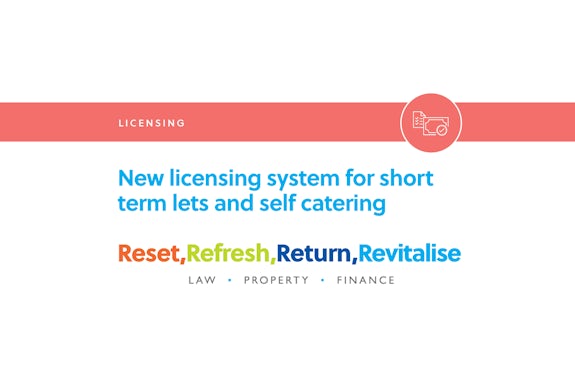There is a new licensing system proposed for the short term let and self-catering sector which is causing concern among the industry. The Association of Scotland’s Self-Caterers, with whom Gilson Gray LLP are a Partner for Business, is submitting a response to the current Government Consultation which ends on 16th October. If you have any clients in this sector they will undoubtedly be affected.
Last week the ASSC carried out a survey, not only of their members but also those in the wider industry. They received over 1,000 responses and a concerning number said if the proposed licensing system came into force they would consider selling their premises, converting to long term lets or ceasing to let and making the accommodation available only to family and friends for no charge. This will have a huge impact on the hospitality industry in Scotland as a whole.
The implications of the new licensing system for those on the ground are numerous, and again there are financial and administrative burdens which your clients may not be aware of or may be concerned about. These include:
- The need to lodge a formal licence application either online or on a paper form;
- Mandatory conditions proposed on licences once issued but with broad powers for each Council to determine how these conditions could be phrased, potentially leading to huge differences from one Council area to another;
- An application fee for a new licence calculated on the basis of the new licensing regime being self-funding. This alone could be financially burdensome for all operators but particularly those with more than one premises;
- A monitoring or annual fee which would be payable over and above a renewal fee every three years;
- Increased certification requirements which again adds cost to the operation of these businesses, many of whom are family run and very small.
The proposed licensing system is opposed by the majority of the short term let community who sought the introduction of a less onerous registration scheme on the basis that it could meet all of the same goals as a licensing regime. The Scottish Government has, however, made the announcement about the new licensing scheme and are drafting the new legislation already.
Short term lets still have to be defined in the new legislation but private residential tenancies where the “landlord” must be a registered landlord are excluded. It is important to differentiate between tenancies and the short term lets. The self-catering industry in Scotland is the sector which will be affected by this. Tourism in general makes up about 13% of Scotland’s economy and the self-catering sector is a huge part of that.
For a short-term let to take place, short-term accommodation is offered to one or more guests by the “host”. The Scottish Government use of the word “host” is unpopular among the industry who prefer operator and will be making that clear in the Consultation responses. The main point of the definition is that the accommodation does not become the main residence of the guest.
In terms of type, the Consultation proposes to exclude what the Scottish Government terms “non-conventional” accommodation such as static caravans, chalets, huts, tepees, pods and similar. The purpose of the legislation is to control the number and use of property as short term lets and avoid housing stock being unavailable for general occupation/long term lets. The Consultation documents also refer to safety as being a big consideration but the industry therefore does not understand why some types of accommodation should be excluded.
If you would like further information on the topic discussed in this blog, please contact Joanna Millar by email: jmillar@gilsongray.co.uk or by phone: 0141 370 8116 / 07747 653 417. You can also view Joanna’s profile by clicking here.
The information and opinions contained in this blog are for information only. They are not intended to constitute advice and should not be relied upon or considered as a replacement for advice. Before acting on any of the information contained in this blog, please seek specific advice from Gilson Gray.








